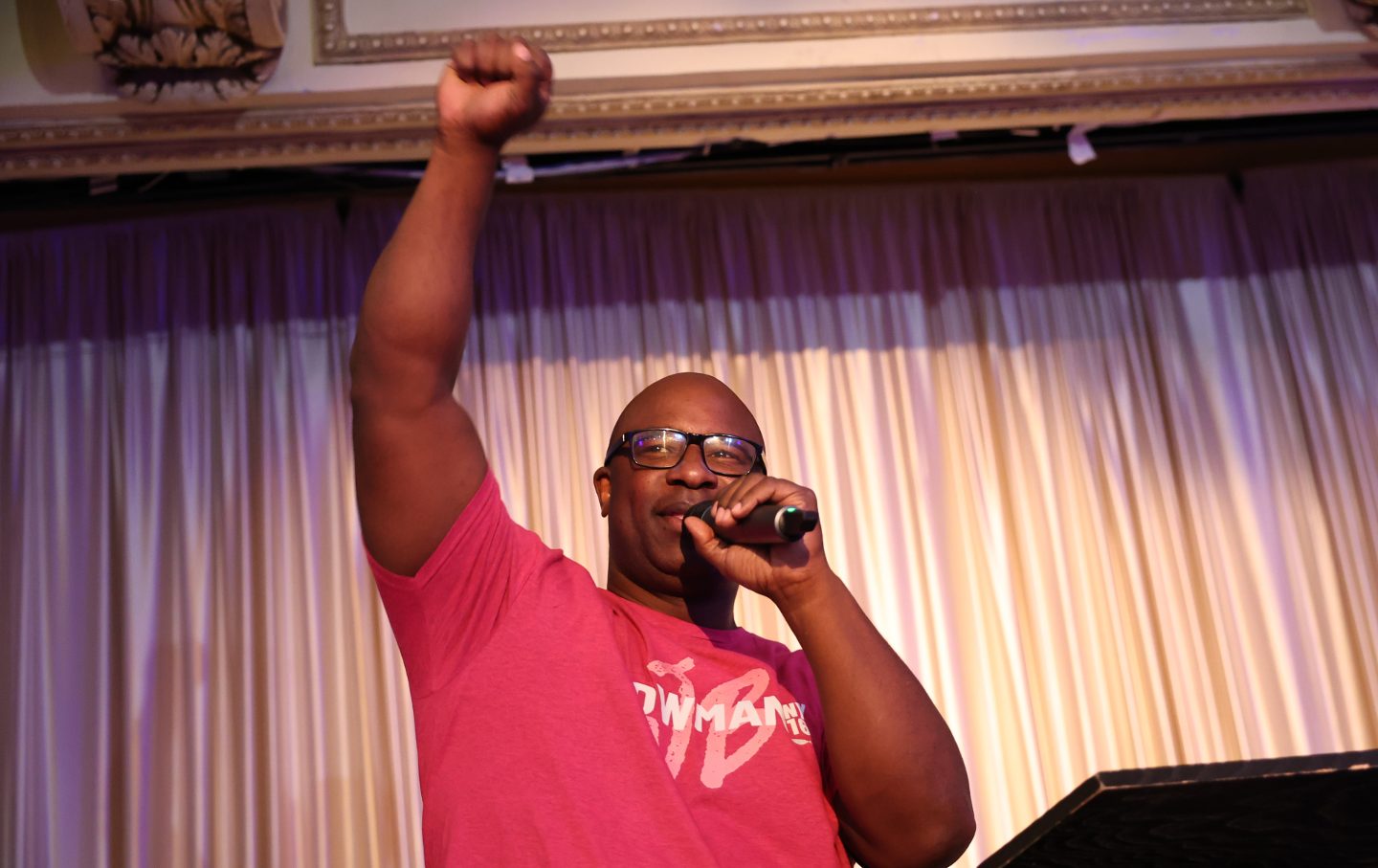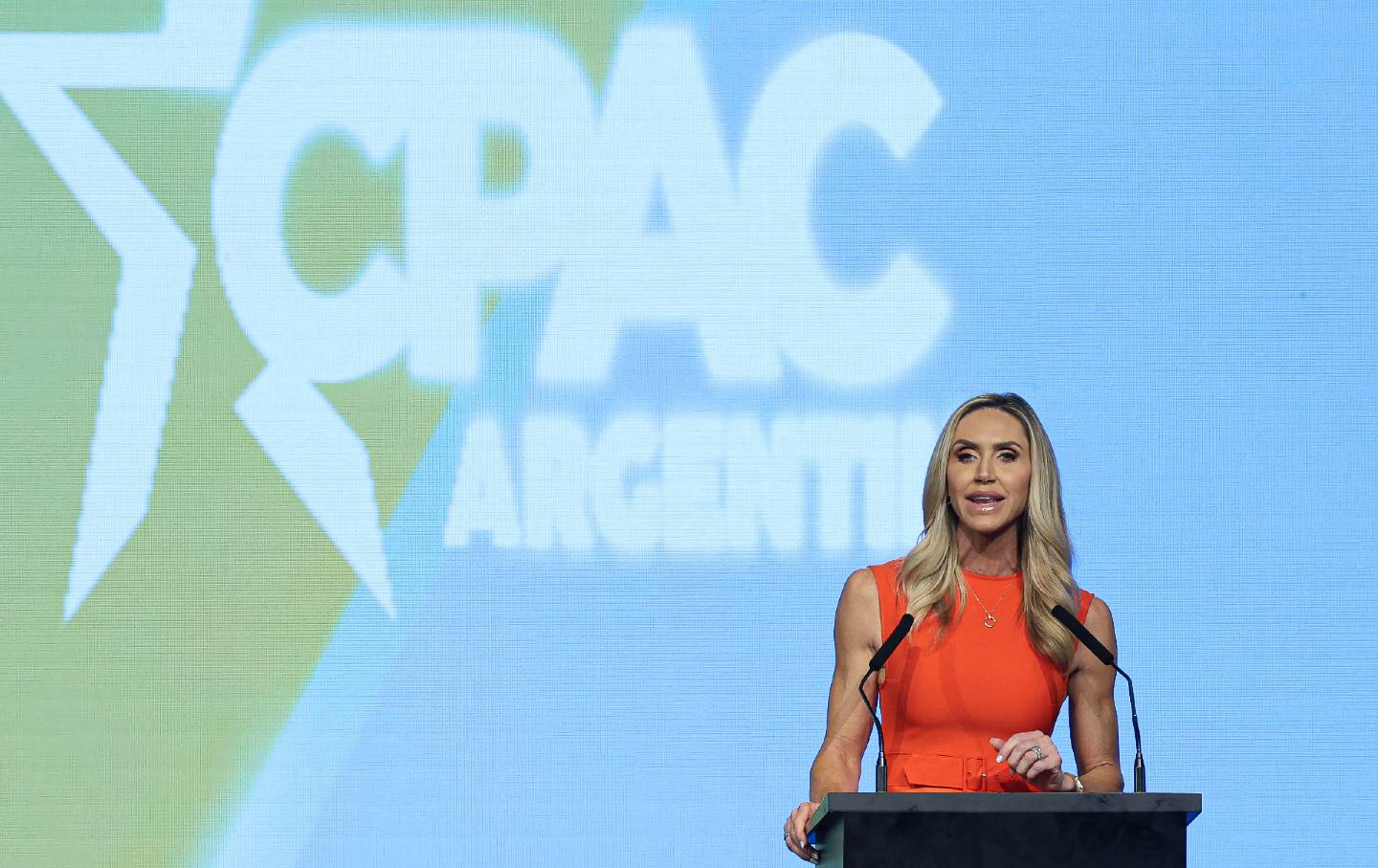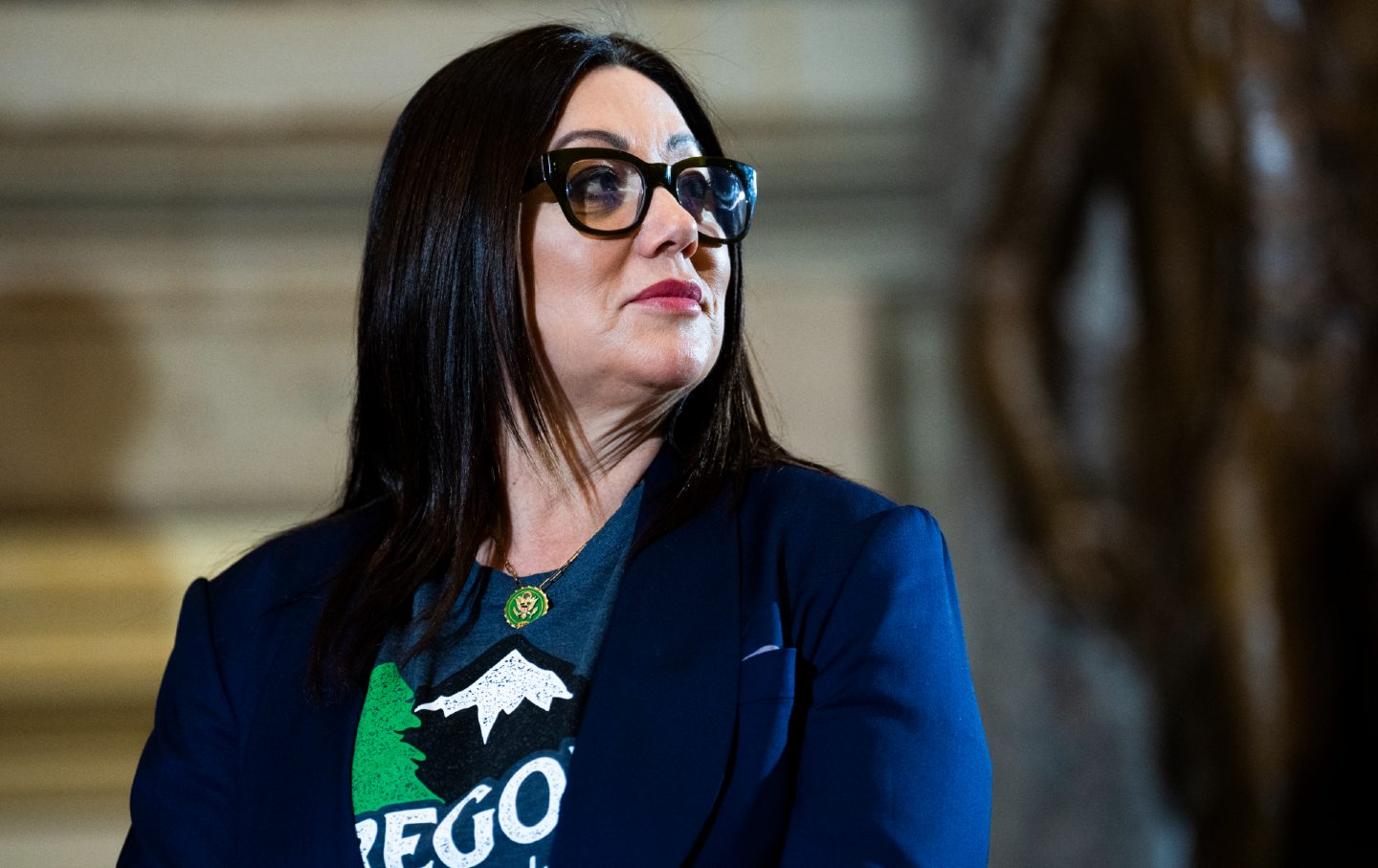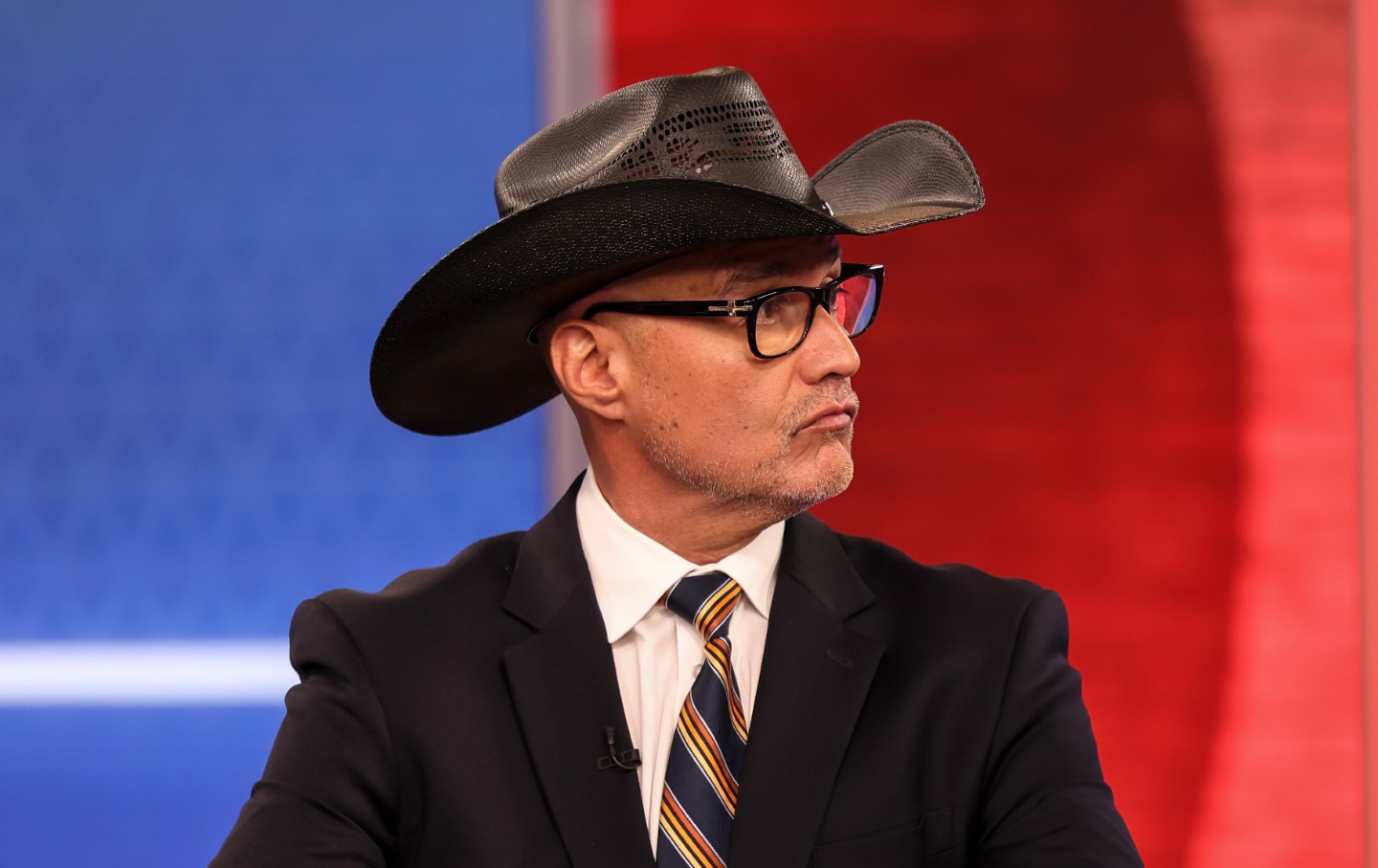What the Left Can Learn From Jamaal Bowman’s Loss
There are key lessons for progressives to absorb from this painful defeat.

Representative Jamaal Bowman (D-NY) speaks during his election night party at the Grand Roosevelt Ballroom on June 25, 2024, in New York City.
(Michael M. Santiago / Getty Images)A longer version of this piece originally appeared on Waleed Shahid’s Substack.
Despite the concerted efforts of Justice Democrats, the Sunrise Movement, the Working Families Party, The Jewish Vote, and other allies who helped Jamaal Bowman unseat Eliot Engel—a staunch pro-Israel congressman backed by $3 million from AIPAC affiliates—in 2020, the campaign infrastructure from that victory couldn’t protect Bowman from AIPAC’s $20 million campaign for former Westchester County executive George Latimer, who defeated Bowman in his congressional primary on Tuesday night.
The power of the streets was not successfully translated into winning seats. The battle was extremely uphill from the start, highlighting the need to build both grassroots and political power to counter AIPAC’s influence in the Democratic Party. It is possible that the movement is simultaneously stronger than ever and yet weaker than it may appear.
Bowman’s rise to office in 2020 was driven in part by the organic momentum of the Black Lives Matter movement, which has since faced substantial backlash. As the district became substantially whiter and wealthier after redistricting, the movement and its philanthropic donors were unable to shield him from AIPAC, partly due to its minimal presence in congressional primaries, despite his continued strong support among Black working- and middle-class voters. Many of the organizations representing the racial justice movement did not spend anything comparable to what AIPAC, or even Justice Democrats, spent on this race. That leaves a lot of power and resources on the table. The racial justice movement’s ability to organize voters, volunteers, and donors will be put to the test again with Cori Bush’s primary challenge from AIPAC-backed Wesley Bell.
However, spending $25 million to unseat a middle school principal from the Bronx is not a demonstration of strength but of desperation. AIPAC is losing the argument on unconditional US support for the Israeli government.
Nevertheless, Bowman’s defeat underscores the necessity for a robust and multifaceted strategy to invest in deepening and growing our organizing infrastructure. I contend that the path to US policy change on Palestine is for the pro-Palestine movement to focus on out-organizing AIPAC within the Democratic Party, a contest in which power is ultimately measured by your ability to win elections and the number of seats you influence.
So what are we to take away from this defeat? Here are some lessons I think we can learn as a movement.
AIPAC is a threat to democracy. This House primary was the most expensive in American history, aimed solely at forcing the progressive wing of the Democratic Party into submission on Israel policy. But the true danger of AIPAC’s approach lies in its failure to convince anyone of their core argument: that voters support US weapons aid to Israel and its war in Gaza. AIPAC hasn’t proven that Democrats back Israel’s war; it’s shown that AIPAC’s millions in Republican donor money can still tilt elections.
According to recent polling in Bowman’s district, 50 percent of voters believed the US spends too much on aid to Israel, while only 17 percent believed the US spends too little. But AIPAC’s $20 million ad blitz, with a staggering $17,000 spent per hour, was like the loudest guy at the bar who won’t shut up. Voters were incessantly bombarded with Republican-funded messages falsely painting Bowman as an anti-Biden Republican, rather than a Democrat. Most ads avoided mentioning Israel or Gaza. Even when voters saw through the Big Money influence, the relentless repetition drowned out the truth and stifled substantive debate about critical issues. This style of campaigning breeds cynicism and disillusionment.
In a true democracy, the 77 percent of Democrats supporting a permanent cease-fire and 71 percent backing conditional weapons aid would be reflected in Congress. However, AIPAC’s influence means many members, even those who oppose the war, fear voting against it. Despite AIPAC’s endorsing 109 insurrectionist members in 2022, Democratic Party leadership and the Biden administration continue to collaborate with it. President Biden has not endorsed these incumbents nor addressed the meddling of pro-Trump billionaires in Democratic primaries.
Ads are effective. The intense, round-the-clock media scrutiny of young student activists on college campuses starkly contrasts with the coverage of AIPAC’s $100 million campaign to unseat dovish Democrats. This imbalance not only distorts the true dynamics of power and influence in America but also undermines the democratic values that critics claim to defend. Why is a well-funded lobby with extensive resources to shape foreign policy largely unexamined, while students, armed with little more than their voices, are labeled as threats to democracy? This disparity reveals a troubling reality: the greatest threat to democracy is the unchecked power of billionaire and Republican donor money in politics, not the voices of passionate student activists.
In every election, candidates make mistakes that voters find unappealing. The opposing side’s job is to highlight these errors and make them a focal point of the campaign. Effective campaigns leverage both paid advertisements and hope for amplification by “neutral” mainstream media coverage.
While Bowman had his missteps, such as pulling a fire alarm, Latimer’s significant errors and controversial views—his stance on housing desegregation, reluctance to criticize Netanyahu and Israel’s bombing of Palestinian civilians in Gaza, and several racist remarks—did not dominate headlines. The media heavily scrutinized Bowman’s fire alarm incident, while largely ignoring Latimer’s acceptance of Republican money to support a devastating war in Gaza, his opposition to a two-state solution, and his support for actions that have led to severe humanitarian crises.
Latimer’s sole reason for being a competitive candidate—the endorsement he received from AIPAC due to his unconditional backing of Netanyahu’s horrific assault on Gaza—was similarly under-scrutinized. The assault on Gaza was barely debated other than within the “tactical framing” of Bowman’s relationship with pro-Israel Jewish voters in the district. Latimer rarely mentioned his unconditional support for the war himself, knowing it was unpopular. The mainstream media’s failure to examine Latimer reveals a significant disparity in coverage, undermining the democratic process.
So what can be done? Through my own work for progressive causes, I’ve realized how pivotal the issue of Palestine is in shaping the broader political landscape. Palestine serves as a wedge issue that the right exploits to fracture the center-left coalition. It is also a tool that conservative, corporate-backed Democrats use to marginalize the growing progressive wing.
Progressives who have avoided taking a strong stance on shaping the Palestinian rights movement must recognize the deep threat AIPAC poses to all our movements and collective interests. The stance a politician takes on Palestine often indicates their willingness to challenge entrenched power and stand up for genuine justice and equality. It is imperative that progressives understand the centrality of this issue and rally together to counteract AIPAC’s influence, for the sake of not just Palestinian rights but the integrity and future of all progressive causes.
We can criticize AIPAC all we want, but we must also focus on building our own powerful strategic infrastructure. Here’s how.
Build stronger donor networks. Bowman’s campaign was significantly outspent by his opponent, largely due to the influx of money from AIPAC and its affiliates. This highlights the critical need for coordinated and well-organized donor networks within the Palestinian rights and broader progressive movement. It’s not enough to rely on grassroots organizing alone; substantial financial resources are necessary to compete effectively in today’s political landscape. Research demonstrates that funding is especially consequential in House races, smaller races, and primaries.
There are numerous left-leaning foundations with substantial funds, yet they’ve failed to invest adequately in PACs like Justice Democrats, or in 501(c)(4)s that conduct robust Palestinian rights advocacy or Arab and Muslim civic engagement. The lack of investment in these areas is particularly concerning, as Arab and Muslim communities are one of the chief targets of far-right Trump authoritarianism. One bright spot is the recent example of Rashida Tlaib sending $500,000 toward Justice Democrats’ independent expenditure. This demonstration of solidarity from elected officials is unprecedented and deserves to be applauded because if one goes down, they all lose.
Liberal philanthropy needs to recognize that neutrality on Palestine threatens the very foundation of progressive liberalism. Arab and Muslim communities are key players in the anti-authoritarian coalition. The lack of investment is pushing these communities to the disillusioned sidelines of general elections or even towards voting for Trump, similar to the shifts toward the GOP seen among Latino voters.
Develop stronger membership organizations. The movement needs to invest in building authentic membership organizations that go beyond social media followings. Bowman’s campaign highlighted the limitations of email lists and/or staff-driven or donor-driven models that lack a real, engaged membership base. We need to build year-round engagement by continuously organizing, registering voters, and developing leadership.
Develop stronger staff, operatives, organizers, and leaders. A robust movement requires an investment in leadership development, political education, and skills training. Bowman’s loss demonstrated that we need more leaders and operatives capable of bridging social movements and electoral politics. Street mobilization efforts can fall short on their own.
Forge coalitions across differences. The necessity for stronger coalitional alliances with various communities cannot be overstated. Bowman’s campaign needed broader support from Black, Hispanic, and Jewish communities, reflecting a gap in coalition-building. One place to draw inspiration from is the climate movement, which worked for over a decade, across multiple movement cycles, to build multiracial and multi-sectoral alliances spanning climate activists, environmental justice communities, and labor unions. This created a broad base of support for the sea change in climate policy that occurred with the Green New Deal and subsequent climate legislation.
Prioritize political education, strategic dialogue, and alignment-building. A key takeaway from Bowman’s loss is the importance of some degree of political education and alignment within the movement, particularly regarding the significance of Democratic primary elections in driving policy change.
If Palestinian-led youth organizations undermine candidates like Bowman out of frustration with the Biden endorsements or the political process, it disrupts the strategy of building a left-progressive pro-Palestine bloc in Congress anchored in the youth vote and progressive and social movement allies. This contradiction causes the media and politicians to question our collective support for the youth movement or why they should sympathize with the movement in the streets. We must ensure that our actions and messaging are somewhat aligned to maintain credibility and effectiveness.
Popular
“swipe left below to view more authors”Swipe →Support Palestinian-led, multiracial mass membership organizations that blend disruptive protest with electoral organizing in Democratic primaries. There is an urgent need to support Palestinian-led and multiracial organizations to channel the energy of mass street protests into productive political action. Similar to the Sunrise Movement, United We Dream, and March for Our Lives, this organizing would integrate street mobilization with legislative advocacy and electoral engagement, transforming grassroots activism into substantial political influence. Funding and support for these efforts are crucial for the movement’s success.
Institutionalize the movement moment. AIPAC will be emboldened by Bowman’s defeat, aiming to unseat Ilhan Omar, Summer Lee, Rashida Tlaib, and others by 2026 and prevent any pro-Palestine Democrat from being elected to Congress ever again. To counter this, we must unite stakeholders from the key forces in the progressive Democratic coalition: racial justice groups, labor unions, reproductive, environmental, immigrant, and LGBTQ rights groups, and other progressive movements within the party. Establishing hubs in key districts and states, fostering a cohesive campaign, and building a united front against AIPAC’s influence will ensure that pro-Palestinian rights remain a priority.
Prioritize strategic communications. Youth-led social movements are driving change but struggle to effectively engage with mainstream media and navigate Washington politics. It’s not about any one policy, but rather about a structural infrastructure gap that persists and blocks the shared ambitions of young people, social movements, and progressive advocates.
The conservative right adeptly employs a divide-and-conquer strategy against the center-left coalition, especially targeting the rifts between “leftists” and “moderates.” The emergence of young people and progressives on the main political stage thus presents an opportunity but also a vulnerability—if these groups can’t effectively communicate their demands, like those concerning Palestine, “defunding the police,” or the Green New Deal, through mainstream media channels, they risk falling prey to the far right’s potent messaging machine.
A key issue for the Palestinian human rights movement is the lack of identifiable, developed youth spokespeople and earned mainstream media persuasion strategies (like the Green New Deal sit-in at Pelosi’s office or the Dreamers campaign), which hampers its ability to control its narrative and influence Democratic voters. It makes sense considering how heavily scrutinized and attacked Palestinian leaders are by their adversaries and by mainstream media. But without choosing its spokespeople, the media and algorithms will do it for them, often to the movement’s detriment. Electing allies is just the beginning; the crucial step is molding a political climate where champions and movements can thrive.
Bowman’s primary loss is a learning opportunity for the Palestinian rights and progressive movement. By building stronger donor networks, developing robust membership organizations, focusing on leadership development, forging coalitional alliances, and prioritizing strategic communications and political education, the movement can position itself for greater success in future elections.
These lessons underscore the importance of a comprehensive, strategic approach in navigating the complex political landscape and advocating for justice and human rights. Incorporating these strategic steps will enable the Palestinian rights and progressive movement to turn the setback of Bowman’s loss into a catalyst for growth and empowerment, ensuring that future campaigns are more resilient and effective.
More from The Nation

No, Kamala Harris Staffers Did Not Run a “Flawless” Campaign No, Kamala Harris Staffers Did Not Run a “Flawless” Campaign
Democratic strategists are still patting themselves on the back for a catastrophic defeat.

The Courts, Trump, and Us: A Q&A With David Cole The Courts, Trump, and Us: A Q&A With David Cole
Last time, the courts were an essential checking force on the Trump administration. This time around, they may again provide a check—if we push.

Congresswoman Barbara Lee on Why Shirley Chisholm Was Right Congresswoman Barbara Lee on Why Shirley Chisholm Was Right
The California Democrat explains why, during her 25 years in Congress, it was important for her “to disrupt and dismantle and build something that’s equitable and just and right.”...

At CPAC Argentina, a Preview of Donald Trump’s Second Term At CPAC Argentina, a Preview of Donald Trump’s Second Term
A far-right international extending from Lara Trump and Steve Bannon to Jair Bolsonaro and Javier Milei joined reactionaries across Europe to promise no safe quarter for the left....

Trump’s Pick for Labor Secretary Won’t Neutralize the Damage His Administration Will Inflict on Workers Trump’s Pick for Labor Secretary Won’t Neutralize the Damage His Administration Will Inflict on Workers
Lori Chavez-DeRemer is as good a pick for labor secretary as one could’ve reasonably hoped for. It’s also, unfortunately, smart politics for Trump.

Democrats Should Listen to What Chuck Rocha’s Saying About Their Party Democrats Should Listen to What Chuck Rocha’s Saying About Their Party
The strategist who helped Bernie Sanders win the Latino vote took himself out of the race for DNC chair—but he’s still got lots of ideas.


